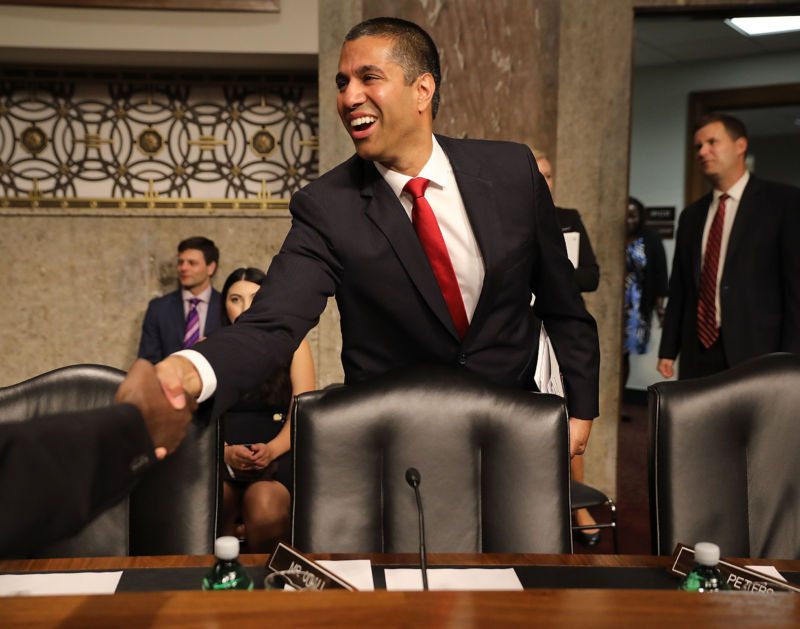
Ajit Pai today celebrated a victory in his ongoing quest to prevent the US government from enforcing net neutrality rules.
The Pai-led Federal Communications Commission repealed Obama-era net neutrality rules, but the repeal could have been reversed by Congress if it acted before the end of its session. Democrats won a vote to reverse the repeal in the Senate but weren't able to get enough votes in the House of Representatives before time ran out.
"I'm pleased that a strong bipartisan majority of the US House of Representatives declined to reinstate heavy-handed Internet regulation," Pai said in a statement marking the deadline passage today. Pai claimed that broadband speed improvements and new fiber deployments in 2018 occurred because of his net neutrality repeal—although speeds and fiber deployment also went in the right direction while net neutrality rules were in place.
"Over the past year, the Internet has remained free and open," Pai said, adding that "the FCC's light-touch approach is working." Pai didn't mention a recent case in which CenturyLink temporarily blocked its customers' Internet access in order to show an ad or a recent research report accusing Sprint of throttling Skype (which Sprint denies).
Pai is “full of it”
"As usual, Ajit Pai is full of it," Deputy Director Evan Greer of advocacy group Fight for the Future told Ars. "His claim that broadband speeds are up is the tech policy equivalent of 'it's snowing outside, therefore climate change is a hoax.'"
Fight for the Future and other advocates led a campaign to pressure Congress into reversing the repeal. In the end, 182 US representatives (nearly all of them Democrats) supported the bill, but 218 votes were needed.
"The fight is far from over," Greer said. "Dozens of anti-net neutrality members of Congress have already lost their jobs, and supporters of the open Internet will soon chair the key committees that provide oversight for the FCC. Ajit Pai won't be laughing long when he has finally has to answer questions like why his agency lied to the media about a DDoS attack that never happened."
The new session of Congress is scheduled to begin tomorrow, with Democrats controlling the House and Republicans controlling the Senate. Rep. Frank Pallone (D-N.J.) will be the new chair of the House Energy & Commerce Committee, which oversees the FCC. After the election, Pallone said that he and other Democrats will act to "protect net neutrality" and "provide meaningful privacy and data security protections."
"I question whether or not Chairman Pai understands how Congress works," Pallone told Ars today, in a response to Pai's statement. "Republicans controlled the House last year and refused to even bring the CRA [Congressional Review Act resolution] up for a vote because they were concerned it would have passed. The net neutrality repeal has been a disaster for consumers. It ignored the will of the American people and gave ISPs an opening to control peoples' online activities at their discretion. The new Democratic majority will work to restore strong net neutrality rules in the House of Representatives this year."
While the simple option of reversing the repeal and reinstating the old rules is no longer available, congressional Democrats could try to pass a new net neutrality law.
The court system could end up having a bigger impact on whether the federal government or individual states enforce net neutrality rules. The FCC is defending its net neutrality repeal in court against a lawsuit filed by more than three dozen entities, including state attorneys general, consumer advocacy groups, and tech companies. Oral arguments at the US Court of Appeals for the District of Columbia Circuit are scheduled for February 1, 2019.
Judges will be asked to decide whether the FCC's net neutrality repeal can remain in place and whether the FCC can preempt state net neutrality laws. California agreed to suspend enforcement of its new net neutrality law while the litigation is pending.
reader comments
135